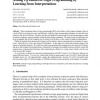74 search results - page 10 / 15 » On Programs with Linearly Ordered Multiple Preferences |
CORR
2000
Springer
13 years 7 months ago
2000
Springer
When comparing inductive logic programming (ILP) and attribute-value learning techniques, there is a trade-off between expressive power and efficiency. Inductive logic programming ...
AI
2002
Springer
13 years 7 months ago
2002
Springer
Automated negotiation is a key form of interaction in systems that are composed of multiple autonomous agents. The aim of such interactions is to reach agreements through an itera...
CORR
2008
Springer
13 years 7 months ago
2008
Springer
A common objective in mechanism design is to choose the outcome (for example, allocation of resources) that maximizes the sum of the agents' valuations, without introducing in...
ENDM
2006
13 years 7 months ago
2006
The students of the Industrial Design department at the TU Eindhoven are allowed to design part of their curriculum by selecting courses from a huge course pool. They do this by ha...
LCTRTS
2005
Springer
14 years 1 months ago
2005
Springer
Dictionary compression mechanisms identify redundant sequences of instructions that occur in a program. The sequences are extracted and copied to a dictionary. Each sequence is th...

